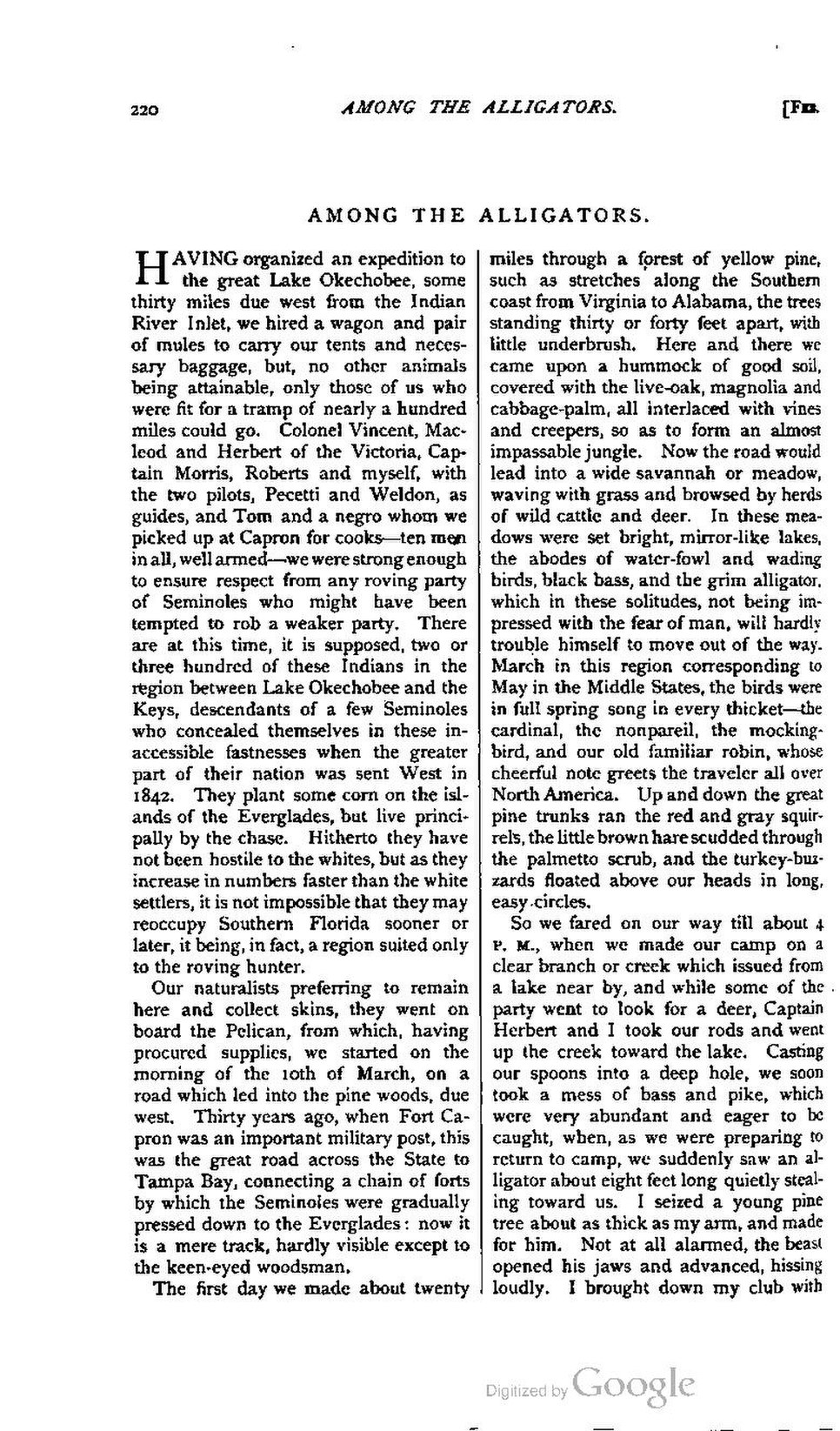AMONG THE ALLIGATORS.
HAVING organized an expedition to the great Lake Okechobee, some thirty miles due west from the Indian River Inlet, we hired a wagon and pair of mules to carry our tents and necessary baggage, but, no other animals being attainable, only those of us who were fit for a tramp of nearly a hundred miles could go. Colonel Vincent, Macleod and Herbert of the Victoria, Captain Morris, Roberts and myself, with the two pilots, Pecetti and Weldon, as guides, and Tom and a negro whom we picked up at Capron for cooks—ten men in all, well armed—we were strong enough to ensure respect from any roving party of Seminoles who might have been tempted to rob a weaker party. There are at this time, it is supposed, two or three hundred of these Indians in the region between Lake Okechobee and the Keys, descendants of a few Seminoles who concealed themselves in these in accessible fastnesses when the greater part of their nation was sent West in 1842. They plant some corn on the islands of the Everglades, but live principally by the chase. Hitherto they have not been hostile to the whites, but as they increase in numbers faster than the white settlers, it is not impossible that they may reoccupy Southern Florida sooner or later, it being, in fact, a region suited only to the roving hunter.
Our naturalists preferring to remain here and collect skins, they went on board the Pelican, from which, having procured supplies, we started on the morning of the 10th of March, on a road which led into the pine woods, due west. Thirty years ago, when Fort Capron was an important military post, this was the great road across the State to Tampa Bay, connecting a chain of forts by which the Seminoles were gradually pressed down to the Everglades: now it is a mere track, hardly visible except to the keen-eyed woodsman.
The first day we made about twenty miles through a forest of yellow pine, such as stretches along the Southern coast from Virginia to Alabama, the trees standing thirty or forty feet apart, with little underbrush. Here and there we came upon a hummock of good soil, covered with the live-oak, magnolia and cabbage-palm, all interlaced with vines and creepers, so as to form an almost impassable jungle. Now the road would lead into a wide savannah or meadow, waving with grass and browsed by herds of wild cattle and deer. In these meadows were set bright, mirror-like lakes, the abodes of water-fowl and wading birds, black bass, and the grim alligator, which in these solitudes, not being impressed with the fear of man, will hardly trouble himself to move out of the way. March in this region corresponding to May in the Middle States, the birds were in full spring song in every thicket—the cardinal, the nonpareil, the mocking bird, and our old familiar robin, whose cheerful note greets the traveler all over North America. Up and down the great pine trunks ran the red and gray squirrels, the little brown hare scudded through the palmetto scrub, and the turkey-buzzards floated above our heads in long, easy circles.
So we fared on our way till about 4 p. m., when we made our camp on a clear branch or creek which issued from a lake near by, and while some of the party went to look for a deer, Captain Herbert and I took our rods and went up the creek toward the lake. Casting our spoons into a deep hole, we soon took a mess of bass and pike, which were very abundant and eager to be caught, when, as we were preparing to return to camp, we suddenly saw an alligator about eight feet long quietly stealing toward us. I seized a young pine tree about as thick as my arm, and made for him. Not at all alarmed, the beast opened his jaws and advanced, hissing loudly. I brought down my club with
